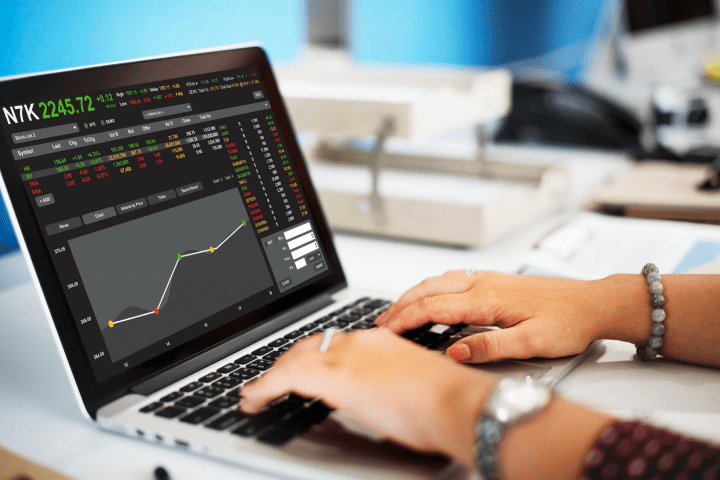

We will give you online trading services

Our representative will contact shortly to you.
OTP has been sent to your mobile
You are very important to us, all information received will always remain confidential. We will contact you as soon as we review your message.
Internet trading is a method of accessing Forex, stock, and commodity markets, as well as electronic marketplaces, through the Internet, allowing traders to conduct real-time trades autonomously.
If you adhere to all of the aforementioned principles, online stock trading will be a simple and lucrative job for you. The key to effective internet trading is practise.
Buying and selling assets via the internet using a brokerage's proprietary trading systems is what online trading is all about. With the advent of cheap high-speed computers and internet connections in the mid- to late-'90s, the usage of online trading exploded. Online trading is available for stocks, bonds, mutual funds, ETFs, options, futures, and currencies. E-trading or self-directed investment are other terms for the same thing.
Investors and traders used to have to contact their brokerage companies to get a transaction executed for them. If John wanted to acquire 50 shares of Intel, he would place a buy order with his broker. John would be informed of the market price and the buy order would be confirmed by the broker. If the investor places a limit order, the broker must confirm the limit price, the length of time the order will be open, the account in which the shares will be purchased (if John has several investment accounts), and other details. The commission charges for making the transaction must also be confirmed by the investment agent. When everything is in place, the broker will enter the transaction into a system connected to trading floors and exchanges like the New York Stock Exchange (NYSE) or the NASDAQ. A transaction confirmation and a monthly or quarterly statement of account with a description of the customer's investments would be sent to the client. John would have to phone in to request a cash transfer from his trading account to his checking account, and vice versa.
With the introduction of the internet in the digital age, an increasing number of investors are turning to their brokers' online trading platforms for DIY (do-it-yourself) investing. For the investor or trader, internet trading platforms act as a centre with a variety of tools. The investor may use the dashboard to place buy and sell orders, as well as market, limit, stop, stop-loss, and stop-limit orders; check the status of an order; see real-time stock prices; read company news; and see a list of securities presently owned. The online system also allows investors to view their investment statements, confirmation statements, and investment tax forms. Most cheap brokerages that are bank-affiliated provide their digital customers even more convenience by connecting their bank accounts to their investing accounts. This allows an investor to quickly move funds across accounts at the same financial institution.
Both investors and discount brokers have benefited from the introduction of internet trading. Brokers charge cheaper fees for transactions made online than for deals placed over the phone with a salesperson to encourage consumers to do their own investing. It's not unusual to spend between $4.95 and $9.99 for an online transaction; the same deal would cost about $29.99 if done over the phone. The reduced costs have also made the capital markets more accessible to individuals who previously couldn't afford the higher commission fees of a personal adviser or an over-the-phone transaction. Brokers save money by employing fewer human agents as they move to automated trading.
Another advantage of online trading is the increased speed with which transactions may be completed and concluded, since there is no need to copy, file, or input paper-based documentation into an electronic format. When an investor places an order online, it is entered into a database that searches all market exchanges that trade the stock in the investor's chosen currency for the cheapest price. The exchange that offers the best price connects a buyer with a seller and provides confirmation to both the buyer's and seller's brokers. When opposed to making a phone call, which must go through multiple confirmation stages before the rep can place the order, all of this is done within seconds of placing a trade.
Before establishing an online trading account with a broker, an investor or trader must do due diligence on the business. Before opening an account, the customer will be required to complete a questionnaire about his or her investing and financial history in order to decide which kind of trading account is best for them. If the investor is unfamiliar with the many kinds of assets and trading techniques available in the financial world, a basic cash account will be established for him to place simple buy and sell orders on stocks, mutual funds, bonds, and exchange-traded funds (ETFs). A skilled trader, on the other hand, who wants to use a variety of trading methods will be granted a margin account where he may buy, sell, short, and write assets such as stocks, options, futures, and currencies.
Depending on your broker, not all securities are accessible to trade online. To make a transaction on any stocks trading on the pink sheets or select stocks trading over-the-counter, some brokers need you to contact them. Furthermore, not all brokers provide commodity and currency futures trading via their online platforms. As a result, it's critical that a trader knows what a broker has to offer before signing up for a trading platform.
Consider using a secure browser. When it comes to internet trading, the first thing you should think about is your online security.